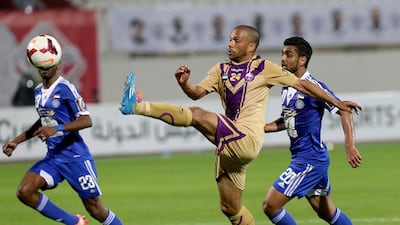Their stadium holds just 500 fans and they have never played in the UAE’s top division. Chances are you have never heard of Al Dhaid Football Club.
On Monday night, the team from the emirate of Sharjah went toe to toe with the country's oldest club, Al Nasr, in the quarter-finals of the President's Cup – and almost went the distance.
Al Dhaid, who are fourth in Division One, took the lead against Al Nasr and held it at half-time. They were 45 minutes from a stunning upset. A penalty and sending off two minutes into the second half proved a turning point as Nasr soon equalised and then had a 3-1 lead with five minutes remaining.
Even then, the Dhaid players did not give up, pulling a goal back two minutes later and subjecting their opponents to a nervous last few minutes. They did all that with barely a supporter cheering them on from the stands of Sharjah Football Club’s stadium.
“This is football, playing 10 against 11 is not easy because Al Nasr is not a small team, they are a big team that plays in the top division and they have good players with experience, more than Al Dhaid,” said Ibrahima Traore, the assistant to coach Mohammed Saeed Al Tunaiji.
“We come from the second division. I tell my players, ‘this is the cup and I’m not angry’. I was proud to see the players play this well.”
Such is the plight of clubs outside the Arabian Gulf League’s elite.
Attention is fleeting, reserved for the rare occasions that clubs such as Dhaid take on more glamorous opponents in the cup.
For Dhaid, it is back to playing in empty stadiums, with not a television camera in sight. Al Dhaid, where they are based, might be the capital of the emirate of Sharjah’s central district, but it is no hotbed of football.
Dhaid, however, is not a football club feeling sorry for itself. “Now we are thinking only of the first division,” Traore said after the cup defeat.
In the previous round of the cup Dhaid had a sensational win over Sharjah rivals and AGL side Al Shaab, which began a four-match winning streak in Division One. The latest, a 1-0 win at home over Al Khaleej, leaves them fourth in the country’s second tier, eight points behind leaders Dibba Al Fujairah, but with two games in hand.
A good cup run has clearly boosted confidence in their league performances. But can Dhaid pull off a historic promotion to the AGL next season?
Those performances suggest they should be daring to dream.
On Monday, despite the sending off, they showed remarkable resilience to take the match to the wire. Scorer of the opening goal, the Burkino Faso striker Pan Pierre Koulibaly, looks to have the sort of physique to trouble many a defender, while the move that led to Tariq Ahmed’s superb second goal would have graced any top-tier match.
Giving further merit to their effort against Al Nasr, Dhaid was also missing two of their more influential players, the Emirati midfielder Mustafa Saeed and Brazilian forward Maycon, both injured in the week before the cup tie.
Already the club has been proactive in the January transfer market, with new signings Mohammed Al Matrooshi and Sameer Ibrahim starting against Nasr.
Crucially, Dhaid continue to rely on a trusted management set up and on promoting from within.
“I’ve been with Mohammed Saeed Al Tunaiji for three years,” Traore said of his former teammate. “He told the administration that he wanted to work with me.
“He gave me the chance to be assistant coach with Al Dhaid because before that I had played six years with him as a player.”
Such long-term partnerships are all but absent in the UAE’s top division, but thrive in the lower divisions away from the crippling demands for instant success.
“Mohammed used to be my captain and when I became a coach he asked me to join him as assistant and in these three years I’ve learnt a lot from him,” Traore said. “I have no bad word to say about him.”
As the Thaid players walked off the field on Monday night, there was a sense that this was an opportunity missed.
Pride was mixed with genuine disappointment, a sign of just how much this humble club has punched above their weight in the country’s premier knockout competition.
The club will hope that matches against Al Nasr – and Al Jazira, Al Ahli and Al Ain – will become more common in years to come. But there is no time to dwell on the past or the future; Dhaid is a club that lives day to day.
Next up, a Division One clash with Masafi on Sunday.
akhaled@thenational.ae
Follow us on Twitter @SprtNationalUAE

